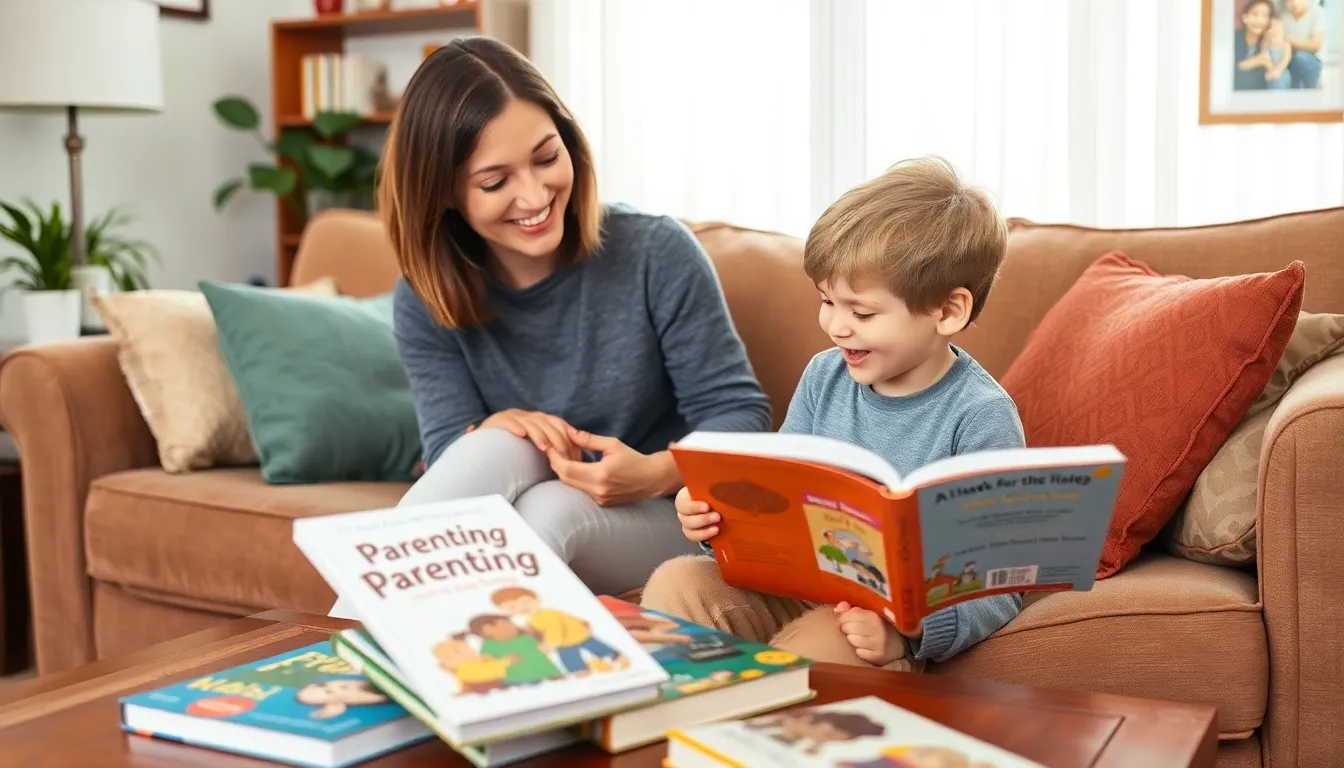Navigating the wild world of parenting can feel like trying to tame a lion while juggling flaming torches. With so much advice out there, it’s easy to feel overwhelmed. Enter authoritative parenting books—the trusted guides that promise to transform chaos into calm. These gems offer a balanced approach, blending warmth and structure to help parents raise confident, resilient kids without losing their sanity.
Table of Contents
ToggleUnderstanding Authoritative Parenting
Authoritative parenting balances warmth and structure, fostering a supportive environment for children’s development. This approach helps parents engage meaningfully with their children while setting boundaries effectively.
Definition and Characteristics
Authoritative parenting emphasizes respect, communication, and responsiveness. Parents practicing this style encourage independence while remaining attentive to children’s needs. They establish clear expectations and enforce consistent rules, providing a sense of security. Empathy and validation play significant roles in their interactions. Parents demonstrate warmth through emotional support, fostering healthy self-esteem in children. This combination creates a nurturing environment that encourages children to express themselves freely.
Benefits of Authoritative Parenting
Children raised with authoritative parenting often exhibit higher self-confidence and better social skills. Research indicates they perform well academically and display greater emotional regulation. These children learn to navigate challenges with resilience and adaptability. Parents adopting this style tend to experience lower levels of stress, benefiting their overall well-being. Strong parent-child relationships emerge, promoting open communication. As a result, children are more likely to engage in positive behaviors and make responsible choices throughout their lives.
Top Authoritative Parenting Books

Authoritative parenting books offer essential insights for nurturing balanced relationships with children. These resources equip parents with strategies that combine support and structure, fostering healthier family dynamics.
Book Recommendations
- The Whole-Brain Child by Daniel J. Siegel and Tina Payne Bryson focuses on brain development. It provides practical strategies for helping children engage their minds and manage emotions.
- How to Talk So Kids Will Listen & Listen So Kids Will Talk by Adele Faber and Elaine Mazlish emphasizes communication techniques. It teaches parents how to foster cooperation and understanding in their children.
- Parenting Science by Gwen Dewar presents research-based information. It covers various parenting topics, offering evidence-backed practices for effective child rearing.
Overview of Each Book
The Whole-Brain Child blends neuroscience with parenting, illustrating how children’s brain development impacts behavior. Practical exercises focus on nurturing emotional intelligence and fostering cognitive skills.
How to Talk So Kids Will Listen & Listen So Kids Will Talk provides actionable advice for engaging with children. The book’s techniques encourage active listening and collaboration, helping to build positive relationships.
Parenting Science compiles credible research into digestible guidance. Each chapter addresses common parenting dilemmas, ensuring parents can make informed decisions about their child’s upbringing.
Key Concepts in Authoritative Parenting
Authoritative parenting emphasizes essential concepts like effective communication and a healthy balance between freedom and structure. These principles guide parents in nurturing their children’s growth.
Communication and Discipline
Effective communication plays a critical role in authoritative parenting. Parents can promote open dialogue by actively listening to their children. Encouraging children to express their thoughts fosters trust and understanding. Clear communication supports the establishment of consistent rules, ensuring children know expectations. Discipline should not rely solely on punishment; instead, it should offer constructive feedback, teaching valuable lessons. Through this approach, children learn to internalize boundaries and develop self-regulation skills, ultimately leading to more positive behaviors.
Balancing Freedom and Structure
Finding the right balance between freedom and structure remains vital in authoritative parenting. Parents provide a secure environment by setting clear boundaries. Autonomy is fostered when children can explore their interests within these limits. Opportunities for independence, such as making choices about daily activities, contribute to their self-confidence. Structured routines help children understand expectations, while flexibility allows for personal growth. This balance cultivates resilience, equipping children to navigate challenges and develop lifelong skills.
Resources for Further Reading
Delving deeper into authoritative parenting can be beneficial for both parents and children. A wealth of resources exists for further exploration of these concepts.
Online Platforms and Communities
Numerous online platforms host valuable discussions about authoritative parenting. Websites like Parenting Science offer research-based insights and practical strategies. Additionally, forums on sites such as Reddit’s r/Parenting provide spaces for sharing experiences and advice among parents. Facebook groups focused on authoritative parenting also serve as supportive communities. These platforms allow parents to connect, ask questions, and learn from various perspectives in a collaborative environment.
Research Articles and Journals
Scholarly articles and parenting journals offer in-depth analyses on authoritative parenting. Studies published in journals like Child Development provide empirical evidence on the impact of this approach on children’s well-being. Research found in the Journal of Family Psychology highlights correlations between parenting styles and child outcomes. Accessibility to databases such as Google Scholar allows parents and caregivers to discover relevant research that informs their practices. These resources contribute to understanding the theoretical underpinnings of authoritative parenting and its long-term benefits.
Authoritative parenting books serve as essential guides for parents navigating the complexities of raising children. By combining warmth with structure these resources empower parents to cultivate strong relationships while fostering independence in their children. The insights gained from these books can lead to healthier family dynamics and improved emotional well-being for both parents and children.
Exploring recommended titles offers practical strategies that can be easily integrated into daily life. As parents embrace the principles of authoritative parenting they not only enhance their children’s development but also find greater satisfaction in their parenting journey. With the right tools and knowledge parents can confidently support their children’s growth into resilient and capable individuals.



